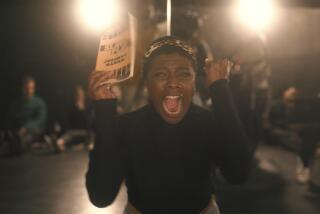Kearns’ Message
- Share via
As a person who has spent one-third of my 32 years living with asymptomatic HIV infection, I applaud Michael Kearns’ life-affirming message (“HIV-Positivist,” by Jan Breslauer,July 3).
For those of us living with AIDS, there is no doubt of its gruesome and devastating nature; however, there are many on both sides of this issue who are too comfortable depicting people with HIV or AIDS as weak, helpless victims. We all too rarely get the opportunity to see those who are strong, healthy and hard-working in the face of rampant fear and homophobia.
When the cure finally comes, the true heroes of this tale will not be the scientists, researchers and doctors but rather those, like Kearns, who refused to compromise their lives under the pressure of those who just want us to be quiet and die because they are afraid to speak out and live.
ROBERT WILSON
Studio City
*
Having had many friends and two lovers die from AIDS during the last 10 years, I feel compassion for Michael Kearns as an HIV-positive and admiration for him as an activist. His essays for the gay press are thought-provoking and insightful.
However, he is delusional if he thinks that his “Camille” failed to attract the audience expected because it was a play about death. What gay play is not about death? Many of them do very well.
It is more likely that Kearns’ “Camille” failed to attract audiences because, despite kind notices, word got out that it was a heavy-handed production of a dated play, poorly performed by a pre-professional cast. Kearns, still a handsome man, makes an awkward and grotesque Camille, and no one involved seemed to know what to do with the script--camp it up or milk the metaphor. Whatever magic Charles Ludlam worked on his acclaimed New York production was not passed down to Kearns.
Sorry, Michael, it’s your fault, not ours.
KENNETH BARTMESS
Los Angeles
*
It was with much interest that I read your interview with Michael Kearns. As a licensed clinical social worker with many years of experience, I am quite familiar with “the system” of foster parenting.
Clearly, the values and depth of caring that Kearns lives by are the virtues that we must pass on to future generations. Increasingly, these values must be reflected in our social institutions.
While in charge of a specialized foster care program in the mid-1980s, I found that this was not always the case. Again, I witnessed the reality that the “traditional,” two-parent family could be devoid of offering the love and protection that foster children so desperately need.
Kearns reminds us that the importance of responsible and caring parenting transcends one’s sexual orientation.
MARNEY E. STOFFLET
Los Angeles
More to Read
The biggest entertainment stories
Get our big stories about Hollywood, film, television, music, arts, culture and more right in your inbox as soon as they publish.
You may occasionally receive promotional content from the Los Angeles Times.










